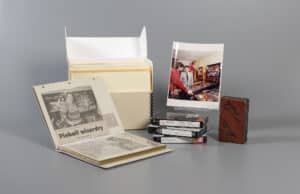ROCHESTER, NY—The Strong National Museum of Play, home of the World Video Game Hall of Fame, recently received a donated collection of materials from the family of Steve Epstein (1948-2020), longtime owner of the famed Broadway Arcade in New York City. The materials include his professional papers related to Broadway Arcade, the Professional & Amateur Pinball Association (PAPA), and unreleased arcade games that he worked on through the years.

“Steve Epstein was an icon in the pinball and arcade communities,” says Jeremy K. Saucier, assistant vice president for electronic games and interpretation at The Strong. “The Broadway Arcade became a coin-operated mecca during the 1980s under his second-generation ownership. Following the legalization of pinball in NYC in 1976, Epstein attracted New Yorkers from all backgrounds to his midtown Manhattan location, including Columbia Records executive John Hammond, and musicians Lou Reed, Diana Ross, and Paul Schafer. We’re proud to be able to tell this important story.”
The Broadway Arcade first opened in the 1930s, and Epstein purchased it from his father in the 1960s. At that time, pinball and arcade elements were still often seen as sleazy. (Pinball wasn’t legalized in New York City until 1976.) Epstein became one of pinball’s biggest evangelists, pushing back against these assumptions. He worked closely with Roger Sharpe and others to cofound PAPA, as well as host pinball leagues, tournaments, and telethons.
“For more than 40 years, Steve Epstein made an indelible impact on the entire coin-operated amusement game industry. His influence on game design, game operations, marketing, and promotion remain unequalled and played an integral role in shaping the direction of how business was done. In many ways, what he achieved and innovated endures to this day and will be his legacy forever,” said Roger Sharpe, author, game designer, and co-founder of PAPA.
The donation provides insights into Epstein’s influence on the coin-operated industry. These materials include correspondence related to publicizing the Broadway Arcade; a scrapbook with news clippings about the Broadway Arcade; photos of Steve and the arcade; proposals for new arcade-related businesses; business cards; PAPA reports and correspondence; promotional flyers, patches, pins, and other PAPA-related merchandise; copies of The Flipside pinball magazine he edited and published; proposals and design documents for unreleased games he worked on; 20 VHS and four audio cassette tapes with interviews and footage from the Broadway Arcade, pinball tournaments, and telethons; and two wooden bricks taken from the Williams Pinball factory floor and signed by former Williams pinball designer Steve Ritchie. The bulk of the materials are from the 1980s and 1990s.
“Steven Epstein was a pioneer in the coin-operated amusement game industry, whose passion for pinball created a space where people of all ages could connect and compete. His unwavering dedication to innovation and community left an indelible mark on New York City’s entertainment landscape as well as the rest of the world. Preserving his materials ensures that future generations can appreciate his contributions and celebrate the vibrant history of arcades and pinball as cultural landmarks,” said Erica Santana and Dale Sperling, Mr. Epstein’s daughters.
These materials will be especially useful to researchers interested in the history of pinball, coin-operated games, arcades, player tournaments and organizations, and movements to legitimize pinball as a sport and positive form of play. They, along with the museum’s existing materials related to the history of coin-operated games—including from significant individuals such as ICE cofounder Ralph Coppola, Bally/Midway/Williams executive Ken Fedesna, and industry lobbyist Millie McCarthy, as well as key companies like Atari, Nutting Associates, and Williams—also help the museum more fully tell the story of this industry.
Some of the Steve Epstein Collection materials are already on display in the museum’s Infinity Arcade exhibit and other elements will be used in future exhibitions and displays.
About The Strong
The Strong is the only collections-based museum in the world devoted solely to the history and exploration of play. It is home to the International Center for the History of Electronic Games, the National Toy Hall of Fame, the World Video Game Hall of Fame, the Brian Sutton-Smith Library and Archives of Play, the Woodbury School, and the American Journal of Play and houses the world’s largest and most comprehensive collection of historical materials related to play.



